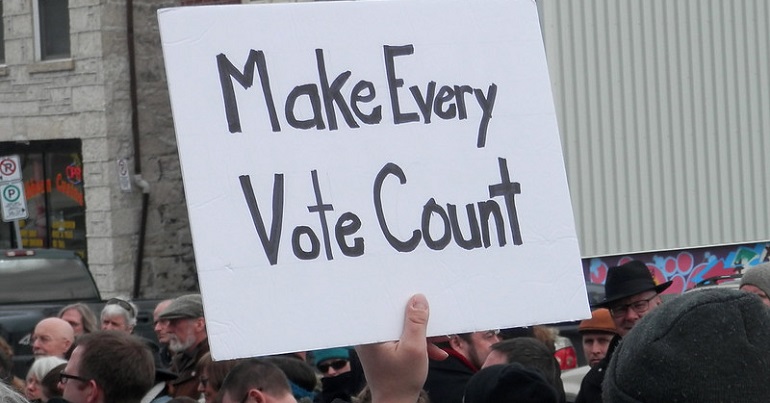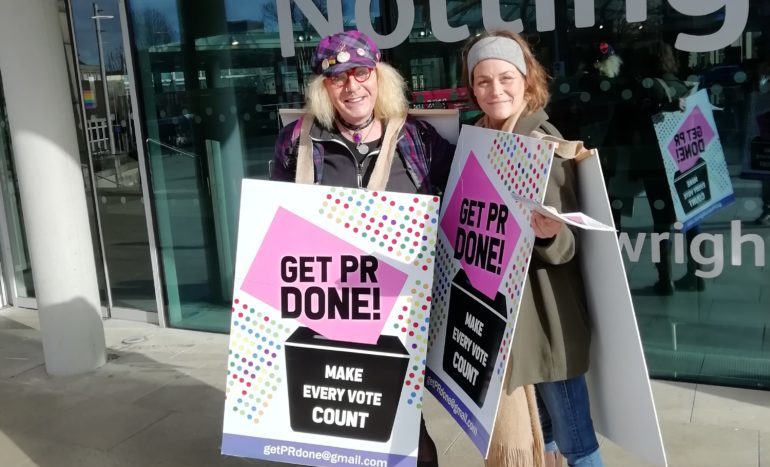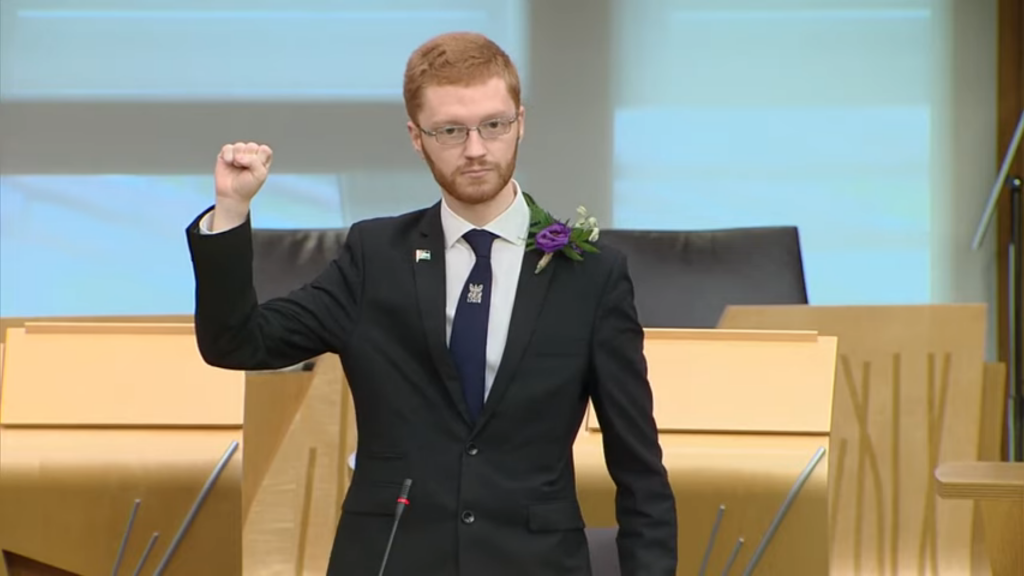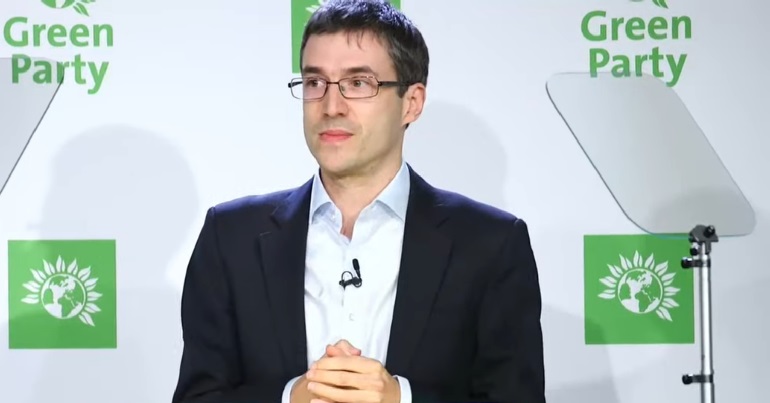It’s time to get PR done

Playing a role, however small, in pushing the Labour Party to commit to a voting system based on proportional representation is a campaigning task worth doing.
That’s the motivation which is directing a new cross-party and no party national activist group GET PR DONE!. The non-partisan group was set up last month after the latest election showed – once again – how undemocratic, downright corrupt and out-of-date the current so-called ‘First-Past-The-Post’ voting system really is.
Nicole Haydock, a spokesperson for GET PR DONE! told Bright Green this weekend:
We are aiming to work with other groups to push proportional representation up Labour’s practical policy agenda just as Labour MP Clive Lewis has been doing in recent weeks.
Haydock continued:
Smaller parties support a major change in both how voting decisions are made and how votes are counted. Tactical voting is an unfair choice and getting Labour on board the PR “train” would isolate the Tories as the only defenders of a totally inequitable voting system set up even before the Labour Party was created.
The UK’s existing voting system was set up in 1884 when child labour was still legal. Women won the right to vote 100 years ago.
The current Labour leadership race provides an excellent opportunity for both Labour activists and members of other parties to raise the PR issue. In the past five days, GET PR DONE! campaigners have leafletted at six Labour hustings and meetings for individual candidates. More are planned. In Nottingham on Saturday, supporters chatted with many Labour members at hustings for both leader and deputy leader candidates. The response to our message was generally, but by no means universally, positive.

An audience member in his 20s who strongly supports a change to PR raised the PR issue at the deputy leader’s session in Nottingham. “All of the candidates waffled,” the young Labour Party member said afterwards.
None of the four Labour leadership candidates have yet endorsed PR either.
In December 2019, however, a survey of Labour Party members found that 76% of them believe Labour should endorse proportional representation as part of an electoral reform plan. Only 12 % want to keep the existing system.
Clive Lewis, the Labour shadow minister and former leadership candidate, is a vocal critic of the current voting set-up. Last week in a speech to the AGM of the Labour Campaign for Electoral Reform, Lewis called on all of the party’s leadership candidates to back PR.
Lewis was not shy in criticising his party’s stance. He said Labour had resisted electoral reform because:
the desire for so-called strong government combines with a deep sense of tribalism that sees anyone outside of Labour’s ranks, and indeed many people within Labour, as the enemy.
The voting system needs to be changed urgently for both practical and moral reasons:
We back electoral reform not because it might be good for us but because it’s good for all of us. We back it because we believe in the equal and powerful voice of all. We hate wasted votes just as we hate wasted lives. We back it because we are democrats – unlocking all the voices.
A proportional representation voting system, which is increasingly common across the world, does what it says on the tin: seats in a parliament or other legislative bodies are allocated to a party on a proportionate basis to the total number of votes that party receives in a general election. Every vote matters.
Just a few statistics from the December 2019 election show how disproportionate – and unfair – the current UK voting system is. Millions of votes are simply wasted. Others are inflated in their impact. For example, the Conservatives got a total of 43.6% of the total vote. That is only 1.3% more than they got in 2017. But it was labelled “a landslide” because the Conservatives now control 56.2% of the seats in the House of Commons. As the initial GET PR DONE! leaflet says: “we are ruled by another elected dictatorship.”
Or compare how many votes it took to elect an MP for different parties. The average vote received by the 365 successful Tory MPs was 38,000. The Greens got a total of 865,000 votes across the UK, but secured one MP, Caroline Lucas. The cruel mathematical upshot? Each Tory vote is worth 23 Green votes.
With Labour suffering its worst electoral defeat since 1935, a growing number of party activists are echoing the collaborative approach of Clive Lewis. On Friday, a long-time friend in the Labour Party in Nottingham sent me a message that said:
Alan: Good luck with this campaign. I have supported electoral reform since way back in the 80s but it has been a struggle to get traction on this with Labour Party members. I sense that opinions are changing post the latest election defeat and there might be an opportunity to get the party to agree a pro-electoral reform position linked to wider democratic reforms such as abolition of the House of Lords.
A Labour activist from Redcar, who also is 100% in support of PR, told me on Saturday he thinks Labour has a “memory issue.” Despite losing four elections in a row, “many in the party still have a memory of winning [under First-Past-the-Post.] “, he said.
“But we live in a different era and I am convinced Labour can only win — by ourselves or in a coalition — through a PR voting system,” he concluded.
Indeed 2005 — the last time Labour triumphed in general election — was a very different era. Tony Blair won a third term in office by winning 355 seats on a mere 35.4% of the vote. How did the Scottish National Party do in 2005? It won six seats, rather fewer than it won in December 2019.
And speaking of Labour and its memory: Keir Hardie, a founder of the Labour Party (whose name was the inspiration for another Keir) was a very strong supporter of PR.
Back in 1913, Hardie was a leading figure in the Independent Labour Party (ILP), one of the constituent parts of the new Labour Party. At its conference that year, the ILP overwhelmingly passed a motion that said:
No system of election can be satisfactory which does not give opportunity to all parties to obtain representation in proportion to their voting strength.
A mere 107 years later, isn’t a worthwhile aim for the Labour Party to take a step forward to help – and yes, you knew it was coming – GET PR DONE!
The GET PR DONE! group (of Labour, Greens, LibDems, one very active Tory supporter, and campaigners from no party) can be reached at: getPRdone@gmail.com
Header image credit: Ryan Hodnett – Creative Commons




No precedent was set when we voted on the Alternative Vote. We only had a referendum then because the Tory government, no surprise, didn’t have introducing AV as part of their election manifesto.
A manifesto commitment to use proportional representation for future elections is all that is required. Then a Citizen’s Assembly, just to decide on the particular system of PR to be used, would be a good idea.
Except in 2011 just nine years ago, we had a referendum on changing the voting system. I know it was to a form of preferential voting rather than proportional voting but even activists and academics confuse the two let alone the general public. What was deafeated was the idea that our present system should be fairer. The thing we need most is a strategy for convincing people other wise and winning a referendum. For this also established the precedent that you need a referendum to change the voting systems. You might not like to hear it but in the areas of the UK that have exposure to alternative forms of voting via regional parliaments and assemblys or local elections, ie London, Wales, Northern Ireland and Scotland the vote was just as crushing.
I say this as i just think electoral reform campaigner should be aware of the facts before they proceed. other wise one day we get a referendum again and get the same result. for the forseable we need to function with the voting systems we have. unfortunatley.
this campaign strategy is actually a campaign to get the Labour party to support electoral reform rather than the general public. As such it should have a better understanding of the labour party. its target intially should be unions and socialist societys and more generally CLPS. Arguments should be tailored to the Labour Party rather than to general ideas of justice. Example Labour wins less often than Conservatives so the idea it cant win a majority on its own is less damaging to them than the torys. I have to say Labour party members will probably look at whats happening to the Social Democrats in Germany and decide this is not for them